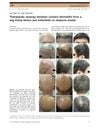 June 2023 in “British Journal of Dermatology”
June 2023 in “British Journal of Dermatology” Baricitinib was effective and safe for severe hair loss treatment over 6 months.
September 2022 in “Dermatologic Therapy” 24 citations,
August 2021 in “Biologics” Stem cell therapy shows promise in improving burn wound healing.
 1 citations,
October 2022 in “International Journal of Molecular Sciences”
1 citations,
October 2022 in “International Journal of Molecular Sciences” Using healthy donor stem cells can potentially calm overactive immune cells and reduce inflammation in severe hair loss patients, offering a possible treatment method.
365 citations,
November 2018 in “Journal of Allergy and Clinical Immunology” People with atopic dermatitis have different skin bacteria, and targeting these bacteria might help treat the condition.
51 citations,
December 2017 in “Skin Appendage Disorders” Stress may trigger hair loss by affecting immune protection in hair follicles.
 18 citations,
October 2020 in “Radiation Research”
18 citations,
October 2020 in “Radiation Research” Some drugs may help treat both COVID-19 and radiation injury.
 9 citations,
January 2020 in “Postepy Dermatologii I Alergologii”
9 citations,
January 2020 in “Postepy Dermatologii I Alergologii” Frontal fibrosing alopecia is a poorly understood condition with increasing cases and unclear treatment effectiveness.
 3 citations,
October 2023 in “Military Medical Research/Military medical research”
3 citations,
October 2023 in “Military Medical Research/Military medical research” Regulatory T cells help heal skin and grow hair, and their absence can lead to healing issues and hair loss.
1 citations,
November 2023 in “International journal of molecular sciences” Cannabinoids might help treat skin problems but more research is needed to be sure.
 July 2024 in “ACS Biomaterials Science & Engineering”
July 2024 in “ACS Biomaterials Science & Engineering” Nanoencapsulated antibiotics are more effective in treating hair follicle infections than free antibiotics.
 April 2024 in “Military Medical Research/Military medical research”
April 2024 in “Military Medical Research/Military medical research” Cellular and immunotherapies show promise for healing chronic wounds but need more research.
7 citations,
February 2022 in “The Journal of Dermatology” The mRNA-1273 COVID-19 vaccine may worsen symptoms in people with systemic lupus erythematosus.
1 citations,
January 1988 Topical DHEA safely increases skin oil production.
 December 2022 in “Small methods”
December 2022 in “Small methods” A new hair loss treatment using dissolving microneedles was found to speed up hair growth and was more effective than daily use of common hair growth drugs.
 8 citations,
April 1988 in “Journal of endocrinological investigation”
8 citations,
April 1988 in “Journal of endocrinological investigation” Topical spironolactone cream doesn't cause hormone-related side effects in the body.
 6 citations,
March 2019 in “International Journal of Molecular Medicine”
6 citations,
March 2019 in “International Journal of Molecular Medicine” Finasteride microspheres help reduce hair loss for up to eight weeks with fewer side effects.
5 citations,
September 2020 in “Proceedings - Baylor University. Medical Center” Tofacitinib successfully treated a woman's severe symptoms from a rare autoimmune condition.
 October 2020 in “Journal of Pharmaceutical Sciences”
October 2020 in “Journal of Pharmaceutical Sciences” Topical finasteride with EGCG or TA improves drug release and dermal uptake, potentially treating hair loss effectively.
 37 citations,
November 1995 in “Journal of Investigative Dermatology”
37 citations,
November 1995 in “Journal of Investigative Dermatology” Topical finasteride and flutamide reduce gland size and enzyme activity, with flutamide being more potent, potentially treating acne, seborrhea, hirsutism, and androgenic alopecia.
 April 2023 in “Journal of Investigative Dermatology”
April 2023 in “Journal of Investigative Dermatology” Some patients who had a severe drug reaction developed long-term hair loss.
 41 citations,
March 2007 in “Journal of dermatological science”
41 citations,
March 2007 in “Journal of dermatological science” Taking L-cystine and vitamin B6 can prevent hair loss caused by smoke in mice.
11 citations,
July 2014 in “Clinical Rheumatology” Cyclophosphamide often causes gastrointestinal issues, hair loss, and low blood cell counts in Chinese patients with autoimmune diseases.
 3 citations,
May 2018 in “Reproductive Sciences”
3 citations,
May 2018 in “Reproductive Sciences” The drug BAY 1158061 is safe, well-tolerated, and shows potential for treating diseases related to prolactin.
 January 2023 in “Records of Pharmaceutical and Biomedical Sciences”
January 2023 in “Records of Pharmaceutical and Biomedical Sciences” Surfactants in spanlastics improve drug delivery by making nanovesicles more flexible and stable for painless administration through the mouth.
3 citations,
November 1998 in “PubMed” Systemic therapy is needed for deep hair follicle infections, and proper dosage is crucial for treatment success.
 4 citations,
September 2018 in “The Journal of Dermatology”
4 citations,
September 2018 in “The Journal of Dermatology” A man's hair regrew from alopecia areata after using tofacitinib and experiencing contact dermatitis from a wig device.

Certain drugs, especially those for eyes, bacterial infections, imaging tests, and skin conditions, are more likely to cause itching, with differences seen across gender, age, and weight.
 April 2017 in “Journal of Investigative Dermatology”
April 2017 in “Journal of Investigative Dermatology” HPH-15, a new compound, effectively reduces skin fibrosis in experiments without causing harm.
 August 2013 in “Fertility and Sterility”
August 2013 in “Fertility and Sterility” High levels of fatty acids are linked to increased androgen production and inflammation in women with PCOS, which may affect IVF outcomes.




















